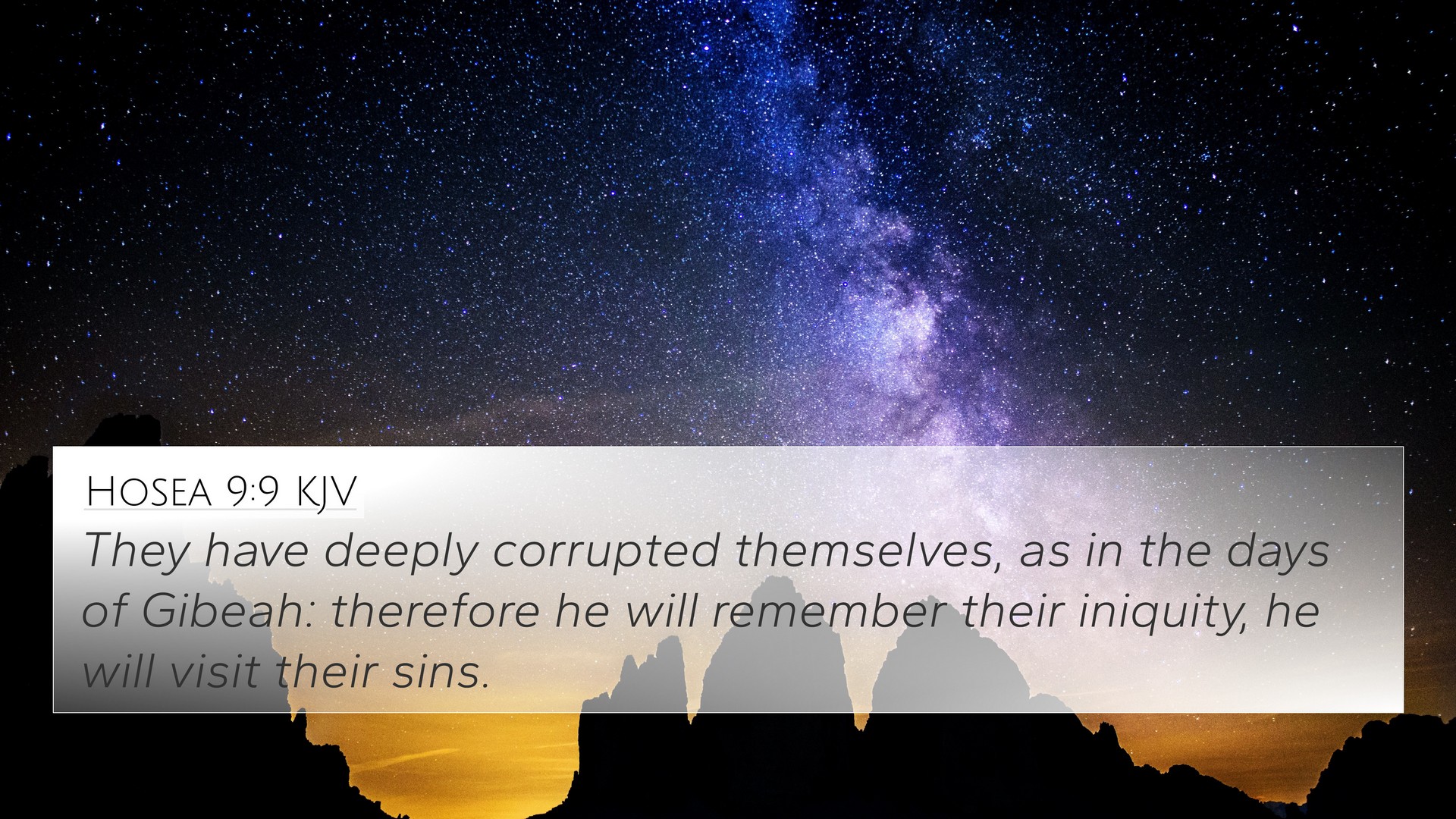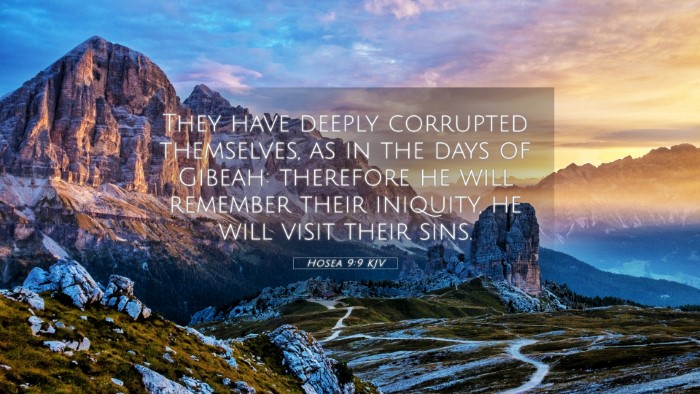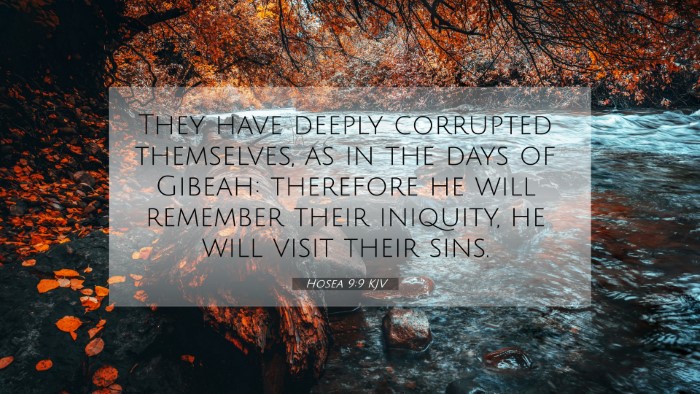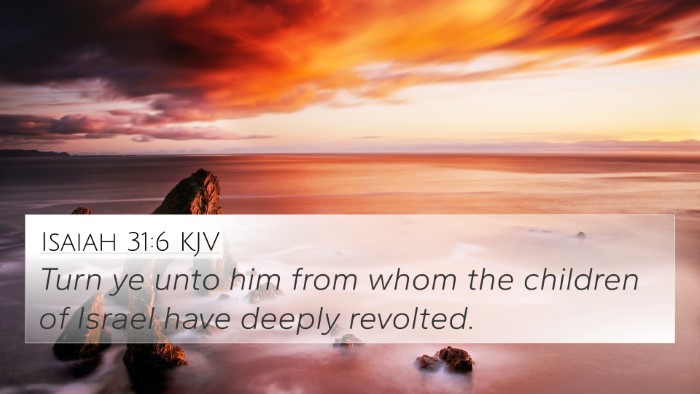Old Testament
Genesis Exodus Leviticus Numbers Deuteronomy Joshua Judges Ruth 1 Samuel 2 Samuel 1 Kings 2 Kings 1 Chronicles 2 Chronicles Ezra Nehemiah Esther Job Psalms Proverbs Ecclesiastes Song of Solomon Isaiah Jeremiah Lamentations Ezekiel Daniel Hosea Joel Amos Obadiah Jonah Micah Nahum Habakkuk Zephaniah Haggai Zechariah MalachiHosea 9:9 Similar Verses
Hosea 9:9 Cross References
They have deeply corrupted themselves, as in the days of Gibeah: therefore he will remember their iniquity, he will visit their sins.
Uncover the Rich Themes and Topics of This Bible Verse
Listed below are the Bible themes associated with Hosea 9:9. We invite you to explore each theme to gain deeper insights into the Scriptures.
Hosea 9:9 Cross Reference Verses
This section features a detailed cross-reference designed to enrich your understanding of the Scriptures. Below, you will find carefully selected verses that echo the themes and teachings related to Hosea 9:9 KJV. Click on any image to explore detailed analyses of related Bible verses and uncover deeper theological insights.
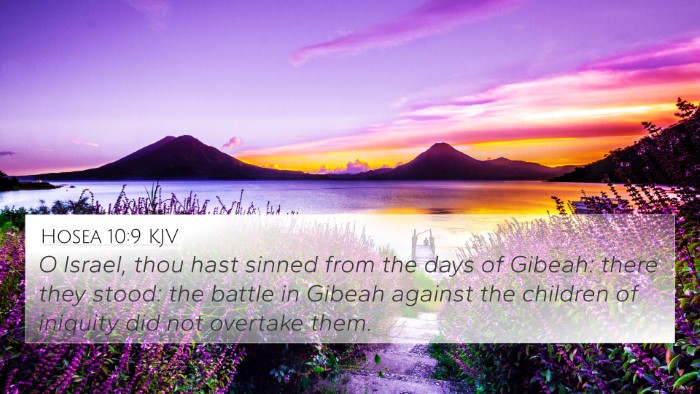
Hosea 10:9 (KJV) »
O Israel, thou hast sinned from the days of Gibeah: there they stood: the battle in Gibeah against the children of iniquity did not overtake them.
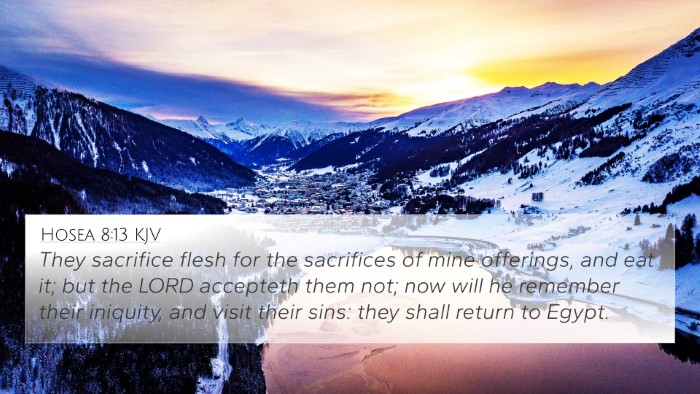
Hosea 8:13 (KJV) »
They sacrifice flesh for the sacrifices of mine offerings, and eat it; but the LORD accepteth them not; now will he remember their iniquity, and visit their sins: they shall return to Egypt.
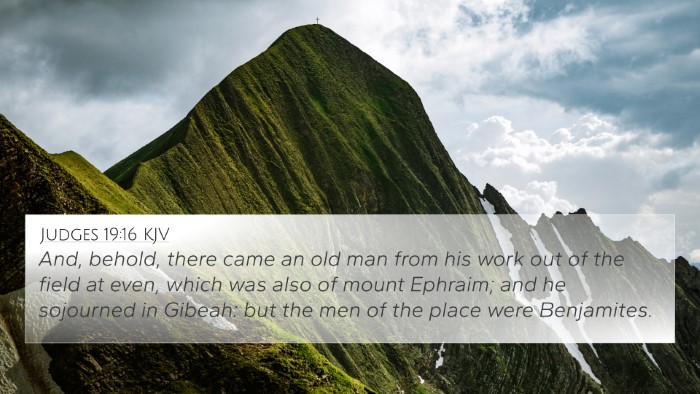
Judges 19:16 (KJV) »
And, behold, there came an old man from his work out of the field at even, which was also of mount Ephraim; and he sojourned in Gibeah: but the men of the place were Benjamites.
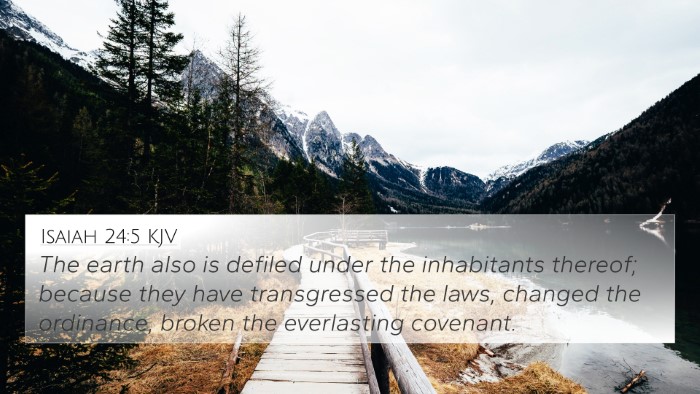
Isaiah 24:5 (KJV) »
The earth also is defiled under the inhabitants thereof; because they have transgressed the laws, changed the ordinance, broken the everlasting covenant.
Hosea 9:9 Verse Analysis and Similar Verses
Understanding Hosea 9:9
The verse from Hosea 9:9 states:
"They have deeply corrupted themselves, as in the days of Gibeah: therefore he will remember their iniquity, he will visit their sins."
This verse addresses the overarching themes of sin, judgment, and divine retribution within the context of Israel's relationship with God. Below is a summary of insights and interpretations from notable public domain commentaries.
Overview of Commentary Insights
-
Matthew Henry's Commentary:
Matthew Henry interprets this verse as a reflection of Israel's moral decay. He highlights that the people have corrupted themselves just as the inhabitants of Gibeah did, which led to severe consequences in biblical history (Judges 19-20). This connection signifies that ignoring God's laws leads to judgment.
-
Albert Barnes' Notes:
Albert Barnes emphasizes the notion of divine remembrance of sins. He notes that God’s judgment is inevitable when His people stray from righteousness. The reference to Gibeah serves as a historical reminder of the severity of sin and its repercussions, indicating that God's patience has limits.
-
Adam Clarke's Commentary:
Adam Clarke points to the gravity of Israel's sins, drawing parallels with other biblical instances of immorality. He stresses the need for repentance and the idea that God does not overlook sin. Clarke elaborates on the inevitable judgment that follows, reflective of God's character as just and holy.
Thematic Connections to Other Bible Verses
Hosea 9:9 ties into numerous other scriptural passages, providing a rich web of thematic connections exploring sin and judgment:
- Judges 19-20: The catastrophic events at Gibeah serve as a historical backdrop to the sinful behaviors Hosea condemns.
- Jeremiah 5:29: This verse reflects God's question about His people’s transgressions and highlights the theme of divine accountability.
- Amos 3:2: Here, God declares His unique relationship with Israel, indicating they bear greater responsibility for their sins.
- Romans 1:18-32: The apostle Paul discusses the consequences of turning away from God and embracing unrighteousness, parallel to Hosea’s message.
- Ezekiel 18:30: The call to repentance is emphasized, echoing Hosea's urgent plea for Israel to return to God.
- Galatians 6:7: This verse sheds light on the principle of sowing and reaping, affirming that God will not be mocked regarding one’s sins.
- Hosea 4:6: It discusses the people’s lack of knowledge leading to destruction, reinforcing the consequences of ignoring God’s laws.
Significance of Cross-Referencing Biblical Texts
This verse encourages deeper study through tools for cross-referencing, supporting the exploration of inter-Biblical dialogue.
- Identifying Connections: Understanding how Hosea 9:9 relates to other scriptures aids in grasping the continuity of themes throughout the Bible—particularly that of sin and judgment.
- Cross-Reference Bible Study: Implementing cross-reference techniques enriches biblical studies, enabling believers to discover profound truths and applications across scriptures.
- Bible Concordance: Using a concordance facilitates the finding of related verses, further enhancing understanding of specific themes.
Conclusion
In summary, Hosea 9:9 serves as a potent reminder of the consequences of moral corruption and the steadfastness of God’s judgment. By exploring links between scripture through thematic connections and comprehensive cross-referencing, individuals can gain rich insights into the nature of God, the seriousness of sin, and the call to repentance.
